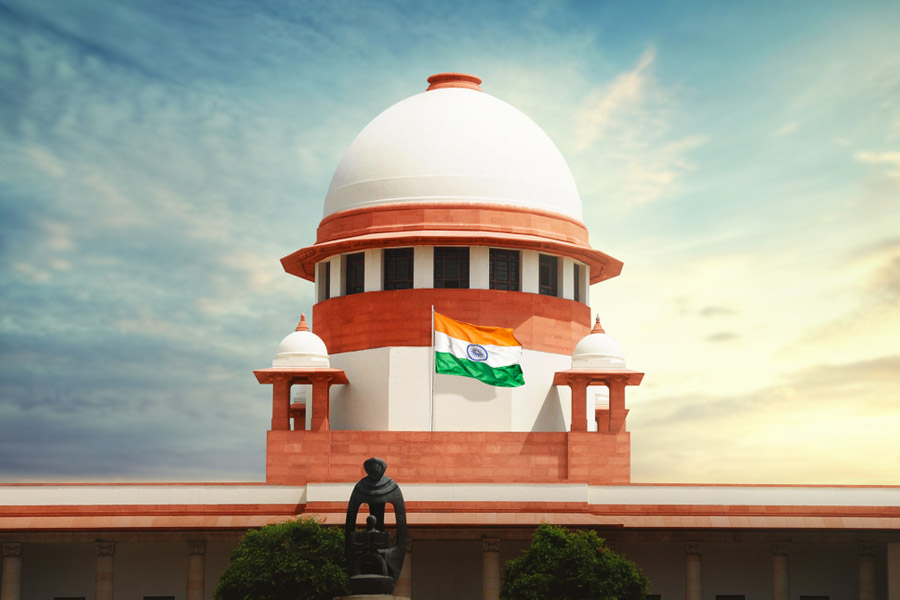Even a Supreme Court order declaring the supremacy of the state poll panels over the statutory human rights panel when it comes to conducting elections failed to build consensus among the opposite ends of the political spectrum in Bengal.
Referring to the apex court quashing on Friday a Special Leave Petition (SLP) moved by the National Human Rights Commission (NHRC) challenging a Calcutta High Court order, the Trinamul Congress called it “light at the end of the tunnel”, much in contradistinction to the BJP’s “Bengal is a special case and must be treated as such”.
The top court snubbed the rights panel for its endeavour to act like a “super Election Commission of India” superseding the Constitutional authority of the EC to supervise and control elections.
The legal imbroglio had its roots in an NHRC notification in June to depute its Director-General (Investigation) as “Special Human Rights Observer” to get a “first-hand information” of recent incidents in Bengal and to conduct an on-the-spot survey in in the state in consultation with the State Election Commission to identify the sensitive constituencies where such violence was likely to occur during the now-concluded panchayat polls.
The DG was mandated by the NHRC to submit a comprehensive report for deployment of “Micro Human Rights Observers” in all the sensitive constituencies during and after the panchayat polls either by engaging the special rapporteurs or special monitors of the commission, with “a solo objective to protect basic human rights”.
Quashing the NHRC's move, the Calcutta High Court had made it clear that the order appointing an observer by the NHRC would clearly make inroads into the election process and would amount to interfering with the powers of the State Election Commission, which is not permissible.
The NHRC appealed against that order before the Supreme Court which was subsequently dismissed on Friday.
In the course of the hearing, however, a bench of Justices BV Nagarathna and Ujjal Bhuyan made certain scathing observations about the petitioner. “It was not a free-for-all situation… NHRC cannot interfere in the exclusive powers given by the Constitution to the SEC and the Election Commission of India… Autonomy of institutions have to be safeguarded… There are places where the NHRC can step in, but it has not done so. It is doing it only in some places… The NHRC cannot become a super Election Commission of India,” the Bench observed.
The top court said the NHRC’s “intentions”, by taking suo motu cognisance of media reports about poll violence in Bengal, may have been good, but the panel had no business kickstarting a “parallel” system of supervision and control over the panchayat elections.
“These are vital observations made by the Supreme Court which should be further spoken about and this is where we question the fragility of various institutions, like the commissions. Why have they become fragile?” responded Sashi Panja, Bengal minister and Trinamul Congress spokesperson. “Their mandate of work should be the same everywhere. The NHRC visited Bengal. Why haven’t they visited other places like Manipur?” she said.
“Also, what happens after those visits? Where are the reports? The reports never come out. So everything goes by optics. They show people that human rights visited Bengal. The optics are limited up to that point. Further on, nobody knows what the outcomes are. May be they found nothing,” Panja added
Drawing similar parallels to the goings on in the state, the TMC leader said: “That’s what’s happening here between the governor and the chief minister. The chief minister is an elected representative of the people. Then why are we having a parallel administration which is being run by a nominated authority?”
“So when the Supreme Court tells NHRC you cannot overstep, we see that happening in other areas of administration as well,” she stated.
“The order is a light at the end of the tunnel. We are very hopeful that this would lead to taking corrective steps. The Supreme Court, in a way, reprimanded them. It’s a beating they took and they should be embarrassed,” Panja remarked.
BJP spokesperson Samik Bhattacharya differed sharply. “We are not here to question the Supreme Court’s judgment. But the panchayat election situation in Bengal is totally different from anywhere else in the country. The elections were supposed to be held for the benefit of the marginalized sections and to ensure decentralization of power. But at the end of the day basic human rights of people are getting trampled, humanity is getting repeatedly defeated here,” he said, adding: “So if someone moves the human rights commission for redress, at least in the Bengal context I don’t consider that irrelevant.”
“Bengal should always be treated as a special case. It’s an aberration which has no parallels elsewhere in the country,” he concluded.
Ends.











